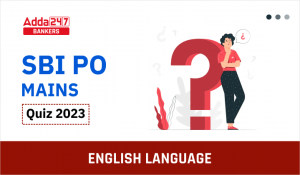
TOPIC: Miscellaneous
Directions
(1-5): Read each sentence to find out whether there is any
grammatical or idiomatic error in it. The error, if any, will be in one part of
the sentence. The number of that part is the answer. If there is ‘No error’,
the answer is e). (Ignore errors of punctuation, if any.)
Q1.The players (a)/
whom we have selected (b)/ for our team (c)/ are young and ambitious. (d)/ No
Error (e)
Q2.The guests (a)/ whom
we were talking about (b)/ have come are my (c)/ brother-in-law. (d)/No Error (e)
Q3.There is none
(a)/who can help you (b)/ in this crucial moments (c)/ of your career. (d)/ No
Error (e)
Q4This is the same
(a)/dog which barked (b)/ at him but fortunately did not (c)/ bite him. (d)/ No
Error. (e)
Q5.Whomever (a)/comes
late will not be allowed (b)/to mark his presence (c)/ in the register. (d)/ No
Error. (e)
Directions (6-15): In
the following passage, there are blanks, each of which has been numbered. These
numbers are printed below the passage and against each, five words suggested,
one of which fits the blank appropriately. Find out the appropriate word in
each case.
The (6) increase in the number of vehicles on Indian roads has
also led to an increase in road accidents. India (7) for 10 per
cent of the global road crash (8) . Statistics show that (9)
more than a million people die due to road accidents every year; if we do not
do (10) about it by 2020 this (11) will double.
Vehicular safety standards are a (12) area. Hence, the United
Nations has (13) 2011-20 as the “Decade of Action for Road Safety”
with the (14) to reduce fatalities by 50 per cent. The UN has
(15) five pillars to achieve this target, i.e. Road Safety
Management, Safer Roads and Mobility, Safer Road Users, Post Crash Response and
Safer Vehicles.
Q6.
(a) fantastic
(b) tremendous
(c) awesome
(d) excellent
(e) terrible
Q7.
(a) calculates
(b) registers
(c) targets
(d) wishes
(e) accounts
Q8.
(a) lethality
(b) numbers
(c) fatalities
(d) disaster
(e) mortality
Q9.
(a) globally
(b) always
(c) entirely
(d) finally
(e) lastly
Q10.
(a) anymore
(b) whatever
(c) all things
(d) anything
(e) everything
Q11.
(a) total
(b) sum
(c) character
(d) amount
(e) figure
Q12.
(a) complication
(b) dispute
(c) problem
(d) question
(e) difficulty
Q13.
(a) announced
(b) disclosed
(c) released
(d) circulated
(e) told
Q14.
(a) aspiration
(b) wish
(c) scheme
(d) aim
(e) course
Q15.
(a) classified
(b) identified
(c) established
(d) selected
(e) separated
S1. Ans.(e)
Sol. No correction is required.
S2. Ans.(b)
Sol. Use ‘who’ in place of ‘whom’ as who is a
relative pronoun which always takes a verb but we don’t use verb after
‘whom’.
S3. Ans.(b)
Sol. Use ‘that’ in place of ‘who’ as after ‘none’
only ‘that’ can be used as a relative pronoun.
S4. Ans.(b)
Sol. Use ‘that’ in place of ‘which’ for the same
reason as explained in the above solution.
S5. Ans.(a)
Sol. Use ‘whoever’ in place of ‘whomever’ as
‘whomever’ is an objective case therefore the verb comes can’t be used. Verb is
used in nominative case and nominative case of whomever is whoever.
S7. Ans. (e)
S8. Ans. (c)
S9. Ans. (a)
S10. Ans. (d)
S11. Ans. (e)
S12. Ans. (c)
S13. Ans. (a)
S14. Ans. (d)
S15. Ans. (b)


 English Quizzes For SBI PO Mains 2023 - ...
English Quizzes For SBI PO Mains 2023 - ...










